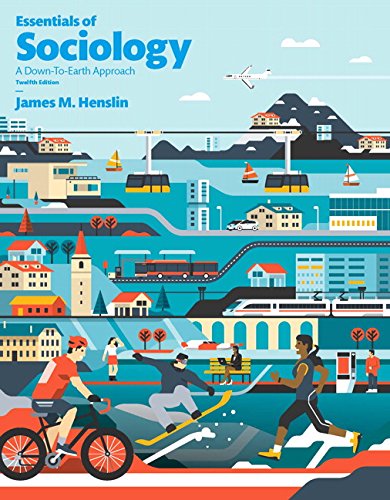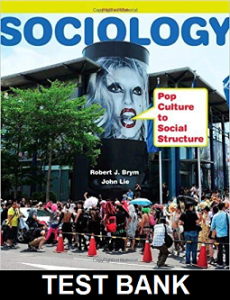Sociology A Brief Introduction Canadian 5th Edition by Schaefer – Test Bank
04
Student: _______________________________________________________________________________________
1. Sociobiologists study:
- individual genetics.
- social influences on human nature.
- how human nature is affected by the genetic composition of groups of people who share certain
characteristics.
- social interaction among primates.
2. Socialization is the process:
- of mentally assuming the perspective of another.
- of discarding former behaviour patterns and accepting new ones as part of a transition in one’s life.
- whereby people learn the attitudes, values, and behaviours appropriate to individuals as members of a
particular culture.
- whereby people normally being socialized are at the same time socializing their socializers.
3. A teacher plans a trip to the theatre for a junior high school class. As part of the preparation, the teacher tells students how they should dress and how they will be expected to act inside the theatre. This is an example of:
- the dramaturgical approach.
- social promotion.
- socialization.
- roletaking.
4. Which term is used to refer to a person’s typical patterns of attitudes, needs, characteristics, and behaviour?
- personality
- social promotion
- socialization
- human nature
5. The relative importance of environmental and biological factors in the socialization process is referred to as the debate over:
- nature versus nurture.
- role versus status.
- manifest versus latent functions.
- sociobiology versus sociology.
6. In the nature versus nurture debate, which position do social scientists take?
- Environmental factors are more important than biological inheritance in human development.
- Biological inheritance is more important than environmental factors in human development.
- It is the interaction between environmental factors and biological inheritance that is important in
human development.
- Biological factors are irrelevant in human development.
7. The analysis of the case of Isabelle is important because it emphasizes the relevance of:
- the twin studies in sociology and psychology.
- the consistency of the developmental processes.
- the sensorimotor stage of development.
- the social interaction in human development.
8. Social scientists now recognize that:
- it is not enough to care for an infant’s physical needs; parents must also concern themselves with children’s social development.
- if young children are kept clean and warm, they will develop normally.
- social interaction for young children is not as important as was once believed.
- Isabelle and Genie were emotionally and socially healthy individuals and that early researchers who
believed otherwise were simply expressing their cultural biases.
9. Harry Harlow’s research with rhesus monkeys indicated that:
- early childhood deprivation could always be reversed with intense resocialization.
- social isolation had a damaging effect on the monkeys.
- there was no comparison between the development of the monkeys and human development.
- midlife deprivation was more serious than early childhood deprivation.
10. Which social scientist studied rhesus monkeys in order to illustrate the importance of socialization for healthy development?
A. Erving Goffman
- Harry Harlow
- Herbert Gintis
D. Samuel Bowles
11. Studies of identical twins have:
- proved conclusively the importance of biological factors in human development.
- proved conclusively the importance of environmental factors in human development.
- proved conclusively that human development is a result of the interaction between environmental and
biological factors.
- been based on extremely small samples and preliminary analyses.












Reviews
There are no reviews yet.